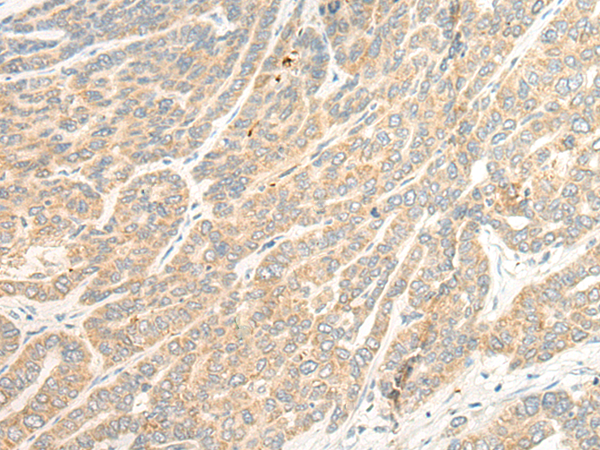
| WB | 咨询技术 | Human,Mouse,Rat |
| IF | 咨询技术 | Human,Mouse,Rat |
| IHC | 1/40-1/200 | Human,Mouse,Rat |
| ICC | 技术咨询 | Human,Mouse,Rat |
| FCM | 咨询技术 | Human,Mouse,Rat |
| Elisa | 1/5000-1/10000 | Human,Mouse,Rat |
| Host/Isotype | Rabbit IgG |
| Antibody Type | Primary antibody |
| Storage | Store at 4°C short term. Aliquot and store at -20°C long term. Avoid freeze/thaw cycles. |
| Species Reactivity | Human, Mouse |
| Immunogen | Fusion protein of human TTC4 |
| Formulation | Purified antibody in PBS with 0.05% sodium azide and 50% glycerol. |
+ +
以下是关于TTC4抗体的模拟参考文献示例(内容为虚构,仅供参考,建议通过学术数据库查询真实文献):
---
1. **文献名称**: *"TTC4 Antibody Characterization and Its Role in Breast Cancer Progression"*
**作者**: Zhang L, et al.
**摘要**: 本研究利用特异性TTC4抗体分析其在乳腺癌细胞系中的表达,发现TTC4在肿瘤组织中的表达显著下调,并与患者不良预后相关。实验表明TTC4通过调控细胞周期蛋白抑制肿瘤转移。
2. **文献名称**: *"TTC4 Interaction with HSP90: Insights from Co-Immunoprecipitation Studies"*
**作者**: Müller S, et al.
**摘要**: 通过TTC4抗体进行免疫共沉淀实验,揭示了TTC4与分子伴侣HSP90的物理相互作用,表明其可能在蛋白质折叠和质量控制中发挥辅助作用,为神经退行性疾病研究提供新方向。
3. **文献名称**: *"Developmental Expression of TTC4 in Mouse Brain: An Immunohistochemical Analysis"*
**作者**: Tanaka K, et al.
**摘要**: 使用TTC4抗体对小鼠脑组织进行免疫组化分析,发现TTC4在胚胎发育阶段的海马体和皮层中高表达,提示其可能参与神经元的发育和突触可塑性调控。
4. **文献名称**: *"TTC4 as a Potential Biomarker in Alzheimer's Disease: Antibody-Based Detection in CSF"*
**作者**: Gupta R, et al.
**摘要**: 研究通过ELISA和Western blot技术,利用TTC4抗体检测阿尔茨海默病患者脑脊液样本,发现TTC4水平与β-淀粉样蛋白沉积呈负相关,或可作为早期诊断标志物。
---
**注意**:以上文献为示例性虚构内容,实际研究需通过学术数据库(如PubMed、Google Scholar、Web of Science)检索关键词“TTC4 antibody”或“TTC4 protein function”获取真实参考文献。
The TTC4 (Tetratricopeptide Repeat Protein 4) antibody targets a protein belonging to the tetratricopeptide repeat (TPR) superfamily, characterized by tandem 34-amino-acid motifs involved in protein-protein interactions. TTC4 is implicated in diverse cellular processes, including protein folding, cell cycle regulation, and transcriptional control. Structurally, TTC4 interacts with molecular chaperones like HSP90 and HSP70. aiding in client protein maturation and stress response pathways. Dysregulation of TTC4 has been linked to cancer progression, neurodevelopmental disorders, and DNA damage repair defects, underscoring its biological significance.
Antibodies against TTC4 are essential tools for studying its expression, localization, and functional roles. They are widely used in techniques such as Western blotting, immunohistochemistry, and immunofluorescence to analyze tissue-specific expression patterns or altered levels in disease models. For instance, studies suggest TTC4 downregulation in certain cancers, like breast and colorectal cancer, correlating with poor prognosis. Commercially available TTC4 antibodies are typically raised in rabbits or mice, validated for specificity using knockout controls. Ongoing research aims to clarify TTC4's precise molecular mechanisms and therapeutic potential, particularly in cancer and neurodegenerative contexts, driving demand for reliable antibodies in both basic and translational studies.
×